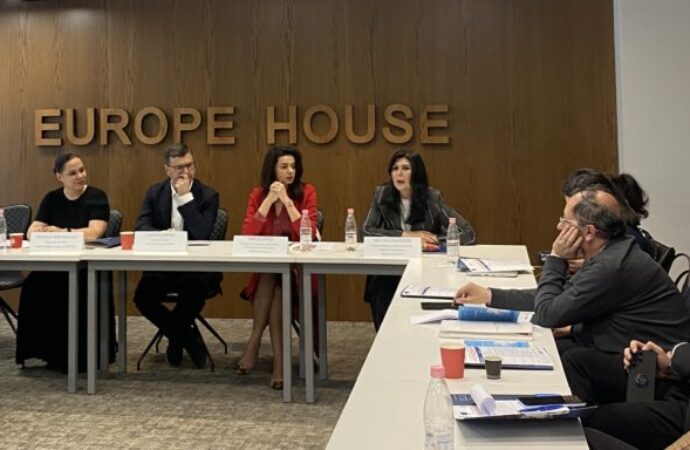On April 29, 2025, the Roundtable on Chapter 24 was held by the Ministry of the Interior and the European Movement in Albania in the framework of the Partnership Platform for European Integration and the National Convention on European Integration. The focus of the roundtable’s information and discussion was on the progress of implementing the National Strategy on Migration 2024–2030 and its Action Plan, with particular attention to the steps taken to fulfill the Intermediate Benchmarks related to migration, asylum, and integrated border management within the framework of Chapter 24. Civil society actors, representatives from universities, and public institutions were engaged in a joint discussion and dialogue, sharing their experiences and recommendations on the issue of migration governance in the context of the negotiation process. An added value was also the contribution of the Slovak expert, who shared Slovakia’s experience regarding the management of regular and irregular migration, specifically after the war in Ukraine.
Gledis Gjipali, Executive Director of the European Movement in Albania, opened this meeting by emphasizing the fact that for the issues covered under Chapter 24, related to migration, there are now strategic documents and intermediate criteria set by the European Union, making it easier to monitor the process of drafting and implementing policies by civil society actors. He also emphasized that this meeting comes as a continuation of the one held a year ago, when the Migration Strategy had just been approved and was being presented to civil society actors. One year later, this meeting serves to understand the progress of the Strategy’s implementation, which recommendations have been taken into account, and how civil society can contribute more concretely moving forward.
Suela Jahaj, Director for Integration and International Agreements at the Ministry of the Interior, presented in detail the intermediate criteria established for Chapter 24 and how the process of fulfilling them has progressed. Two online meetings were held with representatives of the European Commission and public institutions, focusing on the topics: 1) The fight against organized crime (drugs, weapons, money laundering), and 2) Issues related to migration, asylum, Schengen, and visa policies. From these meetings and the work done so far, it has been assessed that there are still gaps and room for improvement in terms of legislation, the completion and reform of the institutional structure, and capacity building. Regarding the strategic framework, Jahaj stated that Albania has a Strategy against Organized Crime, a Strategy on Weapons, an Action Plan, and a Cybercrime Strategy. An important step in the fight against organized crime is the establishment of the Asset Recovery Office (with four staff members), while the approval of the law is expected during the May–June period. Developments have also been made in setting up the National Early Warning System and the establishment of the National Drug Observatory together with the Cannabis Agency. Jahaj emphasized that visa policy and Schengen will be areas where not only technical, but also political and diplomatic decision-making will be required, given that Albania currently has visa liberalization agreements with 13 countries that are not on the EU’s visa-free list. According to Jahaj, this shows that the process takes time and requires capacities not only to fulfill technical criteria, but also political will, involving all actors.
Silvana Banushi, General Director for Migration and Asylum Development at the Ministry of the Interior, in her presentation clarified for the participants how the Migration Strategy and its Action Plan are being implemented, focusing in particular on the achievements so far as well as the challenges and obstacles encountered. She emphasized that spaces like the Roundtable for Chapter 24 are valuable, as they do not merely serve for information, but above all for inclusion and contribution. Banushi stated that along with the Strategy, there is also the Action Plan, which covers a two-year period, as the dynamics and changes in migration policies are frequent and require occasional adaptation and updates. The Strategy has set several priorities, among which Banushi mentioned: strengthening the legal and institutional framework, which includes continued efforts to harmonize national legislation with the Directives and Regulations of Chapter 24. This will also translate into strengthened institutional capacities and clearly defined coordination between institutions and various agencies. Another priority of the Strategy is the prevention of irregular migration and the reduction of abusive cases of asylum-seeking. Banushi stated that today there is a decrease in the number of abusive asylum seekers, but efforts continue both to enable as inclusive as possible information for citizens, as well as through training and institutional capacity building. Meanwhile, she listed some of the achievements realized during this period, such as: Albania becoming an observer member of the European Migration Network, with the contact point placed at the Ministry of the Interior. Another positive development comes with the work done to strengthen the capacities of the State Police, especially Border Police, through training, technological improvement, and increased cooperation for readmission. According to Banushi, the police have a special importance in this process, as they are the ones facing the situations and are on the front line when it comes to managing migration or migrant flows. The decentralization of migration policies is another positive development, according to Banushi, with all municipalities trained regarding services for migrants to enable their integration into society. Other achievements are related to the drafting and soon approval of the Contingency Plan, more focused policies toward the protection of unaccompanied children, and increased attention toward refugee integration, both for their access to the labor market and the recognition of qualifications.
Miroslava Mittelmannová, Program Director at the Human Rights League in Slovakia, presented the migration situation in Slovakia, also offering several recommendations regarding the inclusion and role of civil society actors, as well as the efficient management of migration by public institutions. She shared some concrete data, highlighting that currently around 330,000 foreigners with residence permits live in Slovakia, while asylum applications are at very low levels. Only during 2024, 165 asylum applications were submitted, out of which only 41 individuals were granted asylum status. However, the war in Ukraine in 2022 created an unprecedented situation for Slovakia, with around 110,000 Ukrainian nationals currently residing in the country. Mittelmannová pointed out that Slovak legislation was initially not fully aligned with the EU Directive on Temporary Protection, which created obstacles for the proper integration of Ukrainian citizens. It was the persistence and active engagement of civil society that made it possible to improve and harmonize national legislation with the EU acquis. She positively assessed the fact that the Albanian National Migration Strategy and its Action Plan dedicate particular attention to the role of local authorities and municipalities. Referring to the Slovak experience, Mittelmannová emphasized that local authorities play a key role in informing, providing services, and meeting the needs of migrants and foreigners coming to Slovakia.
The activity continued with a session of questions and discussions with participants from civil society, activists, justice sector professionals, and youth, who focused on the next steps for implementing the National Strategy, areas where a deeper involvement of civil society is needed, and the exchange of experiences with Slovakia, particularly in managing irregular migration.



















